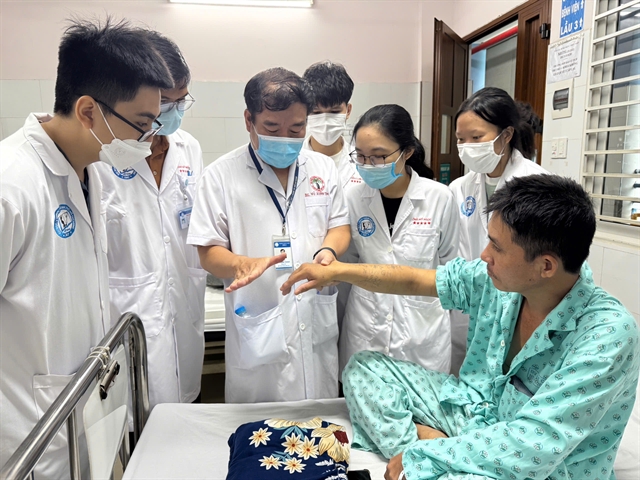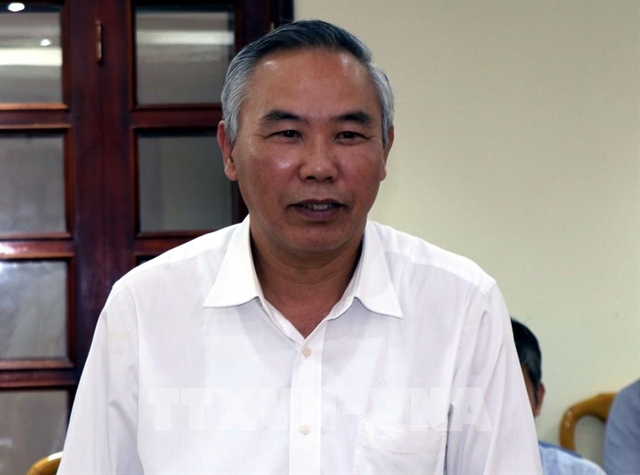 Opinion
Opinion


|
| Deputy Minister of Agriculture and Rural Development Phùng Đức Tiến. VNA.VNS Photo |
After nearly four years of implementing solutions to combat illegal, unreported and unregulated (IUU) fishing, the European Commission (EC) has acknowledged Việt Nam’s commitment, political determination and efforts to deal with the matter.
Deputy Minister of Agriculture and Rural Development Phùng Đức Tiến talks to the Vietnam News Agency about solutions to soon get the yellow card removed
Could you tell us about Việt Nam's work to combat IUU fishing in recent years?
Since 2012, 27 countries have been warned by the EC. Out of 21 countries that were issued yellow cards, Việt Nam is among the seven remaining countries that have not had the cards removed yet. The six other countries got red cards and three of them have since had them removed.
According to former Deputy Prime Minister Trịnh Đình Dũng, in nearly four years, Việt Nam has mobilised the whole political system to get involved to have the yellow card removed.
Việt Nam's fishing volume has decreased according to the Law on Fisheries. The assigned fishing quota is based on the actual number of boats. The granting of a new quota is only for offshore and large-scale fishing vessels to both exploit resources and ensure national defence and security.
However, the fisheries infrastructure for many years has not been paid adequate attention. Food safety and hygiene could not really be ensured at ports, not to mention the fact that ports’ capacity might not be enough.
The Law on Fisheries took effect in 2019, so far the implementation time has not been long but the Government has directed localities to act very aggressively regarding the matter. As a result, Việt Nam has made a very positive change from investment in facilities, equipment, and a good management team. The EC also assessed that we’re going in the right direction and making a positive change.
What limitations does the EC also point out about Việt Nam's fisheries?
There are a number of limitations that the EC pointed out. One is the legal system. During the implementation process, we have to amend any regulations that are still not suitable with the practice and recommendations of the EC.
Therefore, this year Việt Nam will amend Decree 67/2014/ND-CP on a number of policies on fisheries development, Decree 42/2019/ND-CP on stipulating penalties for administrative violations in the fisheries sector and Decree No. 26/2019/ND-CP detailing a number of articles and measures to implement the Fisheries Law and circulars on fishery monitoring activities.
The second is fleet management. Although the violations of our vessels in foreign waters have decreased a lot compared to previous years, they are still a problem. The EC has confirmed that while we still have vessels that violate these regulations, they will not remove the yellow card. This is a very difficult problem.
In this regard, the Government has assigned the Ministry of National Defence to work with the Ministry of Public Security and the Ministry of Agriculture and Rural Development. The Ministry of Defence has been very active to monitor and supervise Vietnamese fishing vessels.
The third is the traceability of seafood. This is a longstanding problem since we do not have adequate infrastructure conditions.
The EC examines this very carefully, from exploitation to port level, classification, processing factories, exports, and they even check the origin of imported goods for processing. All must be counted and have a strict process.
The fourth factor is law enforcement. From 2019 to now, the implementation time of the Fisheries Law has not been long. Although we have been rather active in disseminating information about the law at fishing ports and wharf, along with disseminating knowledge and documents, understanding of the legal system and regulations is still limited among businesses and fishermen.
Therefore, while some localities will handle fines and request remedial measures for violations, some localities only give out warnings. The law enforcement is not synchronised between provinces, leading to a situation that when fishing vessels cannot enter one port, they will enter another port.
What should localities do to all get on the same page regarding IUU fishing?
This is an important political task, so the city and provincial Party Committees must focus on the implementation of Directive 81-CV/TW. If the yellow card cannot be removed, Việt Nam will face a very high risk of a red card and this will immediately affect the image of Việt Nam in the international arena.
Recently, leaders of the Ministry of Agriculture and Rural Development inspected each fishing port and fishing wharf, carefully scrutinising the implementation of log records. In the past, many local authorities did not pay enough attention to this matter.
Therefore, in the new period, with the new Government, it is necessary to first reorganise the national steering committee. Along with that, localities also have to restructure the department in charge of supervising this issue so that we have the same voice and action from central to local levels.
Việt Nam’s fishing ports and wharves still have many limits. How should the investment in this system be used to improve the quality and efficiency of exploitation as well as overcome the IUU yellow card?
Investment in fisheries infrastructure, including upgrading fishing ports and wharves, will be taken care of by the Ministry of Agriculture and Rural Development.
In the ministry's public investment plan in the medium term 2021-2025, the medium-term public investment budget for fisheries infrastructure will be raised, especially for fishing ports and fishing wharves.
In addition to central resources, the provinces also need to have their own investment resources. Along with that, localities must strengthen fishing port management boards and have qualified human resources and equipment to detect violating fishing vessels. VNS